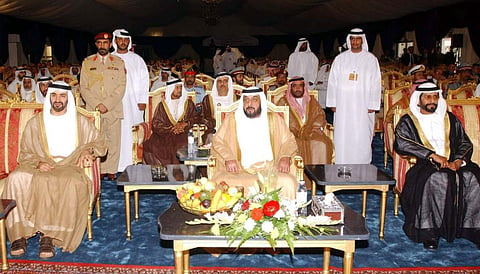October 30, 2002: Khalifa opens Borouge complex
October 30,2002: Khalifa opens Borouge complex

2002 His Highness Shaikh Khalifa Bin Zayed Al Nahyan, Abu Dhabi Crown Prince and Deputy Supreme Commander of the UAE Armed Forces, opened the Borouge Petrochemicals Complex in Al Ruwais. The $1.2 billion complex consists of an ethylene-breaking unit with a production capacity of 600,000 tonnes a year and two power-star polyethylene lines with a production capacity of 450,000 tonnes a year. Shaikh Khalifa said Borouge represents a bold symbol of development and advancement of the UAE’s oil and petrochemicals industries. This, he said, proves the importance of the UAE’s position in the world economic arena, particularly in energy and petrochemicals industries, which contributes to the comfort and prosperity of humanity at large. “This great achievement is a clear example of a fruitful and constructive cooperation be-tween our national companies and international companies, which provided investments, compe-tent staff and expertise for the construction of this great complex,” Shaikh Khalifa said.
Other important events
1817 Simon Bolivar organises independent government in Venezuela.
1918 Czechoslovakia is proclaimed an independent republic.
1928 Experimental transmission of still photographs by television begins in Britain.
1930 Treaty of friendship between Greece and Turkey is signed in Ankara.
1945 The US government announces the end of shoe rationing.
1961 The Soviet Union tests a hydrogen bomb with a force estimated at 58 megatons.
1963 Algeria and Morocco sign a peace agreement in a border dispute.
1973 The Bosphorus Bridge opens in Istanbul, Turkey.
1975 Prince Juan Carlos becomes Spain’s acting head of state after Generalissimo Francisco Franco concedes that he is too ill to govern.
1980 Algeria frees former president Ahmad Ben Bella.
1983 A powerful earthquake hits eastern Turkey killing more than 1,300 people in Erzurum and Kars provinces.
1986 The first fibre-optic undersea telecommunications cable across the English
Channel went into service.
1992 Heavy fighting breaks out in Luanda, Angola, between the government and the Union for the Total Independence of Angola.
1993 Two gunmen open fire in a village pub in Northern Ireland, killing seven.
1995 Quebec votes against separation from Canada by 50.6 per cent to 49.4 per cent.
1998 Turkish police forces storms a hijacked airliner at Ankara airport, freeing 40 passengers and crew and killing an armed hijacker.
1999 The last Indonesian troop ship sails out of East Timor, ending a bloody 24-year military engagement in the now independent nation.
2000 A Supreme Court judge, his bodyguard and chauffeur are killed in southern Spain by a suspected Basque separatist car bomb.
2005 Middle East’s first private airline Jazeera Airways lands in Dubai.
2006 Two truck bombs explode minutes apart at two police stations outside Algeria’s capital, killing three people.
2008 A series of coordinated bomb blasts tears through Indian state of Assam, killing at least 61 people.
2010 A suicide bomber blows up in an Iraqi cafe near Baghdad, killing at least 30 people.
2012 Bahrain bans all rallies and public gatherings.
2013 A private bus travelling from Bengaluru catches fire in Mahboobnagar, Andhra Pradesh, killing 45 passengers.
2014 Sweden, the first European Union country member, officially recognises the state of Palestine.
2015 China announces new population control policy which allow Chinese couples to have two children.
2016 Earthquake destroys buildings in numerous places in central Italy.



